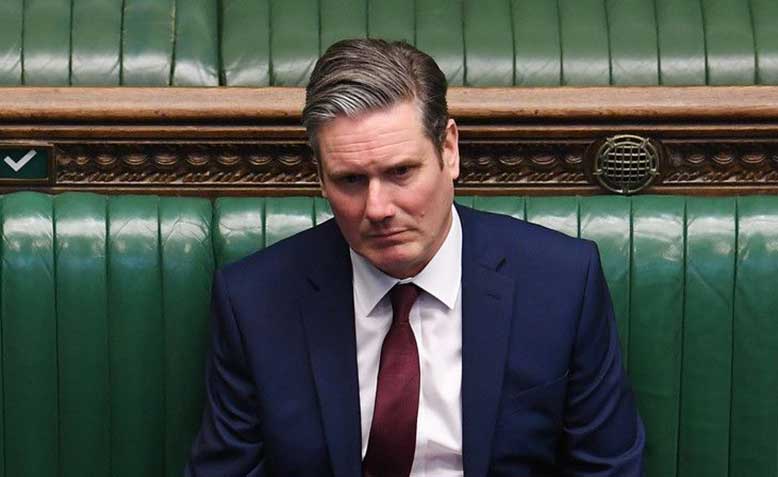 Keir Starmer in the Parliament. Source: Flickr - UK Parliament
Keir Starmer in the Parliament. Source: Flickr - UK Parliament
Kevin Potter explores whether Labour’s attempt at constructive opposition is actually opposition at all
It is now almost a month since Keir Starmer became the leader of the Labour Party. Some may argue that this is too short a time to make any meaningful analysis of his leadership, particularly as he took office in the middle of a crisis. Whilst it is true that he has had little chance to present a policy platform or his self-declared ‘forensic’ opposition, much has happened that signals the direction he is likely to take the party in. Indeed it is during a crisis that we see most clearly the character of political leaders. From a left perspective, the early signs are, sadly, not encouraging.
First, for all the talk of ‘unity’ and ‘bringing the party together’ his selection for shadow cabinet marked a fairly straightforward and rather sharp move to the right. Roles were given to some of the most vocal opponents of Jeremy Corbyn and the left like Jonathan Ashworth, Jess Phillips, Stephen Kinnock, and Liz Kendall. Meanwhile, the socialist left was all but purged as Richard Burgon, Barry Gardiner, Ian Lavery, John Trickett were shown the door (McDonnell, Corbyn, and Abbott, had already said that they wouldn’t accept roles). For ‘unity’ read ‘return to the centre’.
The leaked report into the management of anti-Semitism cases within the party hit Starmer with a political crisis as soon as he took office. The shocking, if not entirely surprising, revelations highlighting the lengths the Labour bureaucracy to undermine Corbyn and the vitriol involved, have appalled thousands of members.
The contents of emails and Whatsapp conversations display clear breaches of Labour rules by party staff, which should result in dismissal from the party. But instead of condemnation and a determination to robustly investigate and punish those found to have breached Labour’s rules, Starmer’s response has been to focus upon those responsible for leaking the report. It appears that the report is in fact not going to be sent to the EHRC on a spurious technicality that it would breach confidentiality laws.
If this turns out to be the case it will result in the protection of people who undermined party democracy and the party membership and in fact worked against the interests of the party. This would mark a turn away from openness and would be a breach of natural justice. But it would also send another signal to the many enemies of Corbyn in the bureaucracy and the parliamentary party that the Corbyn days are over, that there will be no honest accounting for what happened in that turbulent time. In short, they can relax.
However, it is Starmer’s response to the Corona crisis that is perhaps most worrying. As Monday night’s Panorama programme showed, the Tories’ handling of the crisis is a national scandal. Britain is among the worst in the developed world in terms of its response, a fact reflected in the sky-high mortality rate (which is far worse than official statistics imply, and they are awful enough).
From the callous establishment embrace of ‘herd immunity’ to the continuing failure to procure PPE for NHS staff and the inability to test and contact trace, the government’s response has involved serial disasters, serially but not successfully covered up. It is of course widely recognised too that the ability to respond was compromised from the start by a decade of Tory cuts and underfunding.
Surely the role of opposition in this situation should be to challenge these deadly failures and to push relentlessly for the lifesaving equipment, the testing, and other measures that we need? Not from Keir Starmer. Instead, he talks of being ‘a constructive opposition,’ of wanting to work with the Tories. His virtual silence shows that ‘constructive criticism’ means pretty much no criticism at all. Even worse, when he has become animated, it has been to push for an end to special measures. In a clear pitch towards corporate interests, it is Starmer that is agitating hardest for an end to the lockdown as a priority, demanding an exit strategy.
In doing so he toys with the lives of working people, allowing the continued prioritisation of profit over health, wellbeing, even survival. He actually looks more out of touch with the gravity of the situation than some Tories. There should be no discussion of ending lockdown until the NHS is properly equipped to cope until testing and tracing are rolled out on an industrial scale.
Labour members who were given hope by Jeremy Corbyn are now asking themselves whether to ‘stay and fight’ within the party or to leave and continue the struggle for a better world beyond the strictures of Labour.
As that discussion takes place, no-one can be under any illusion that there is going to be much continuity Corbynism in a Starmer-led Labour Party. The conclusions of this are far-reaching. By abandoning the radical critique of austerity and free-market economics and the purposeful opposition to injustice and inequality pursued by Corbyn, the Labour leadership under Starmer is providing no kind of opposition at all.
Before you go
Counterfire is growing faster than ever before
We need to raise £20,000 as we are having to expand operations. We are moving to a bigger, better central office, upping our print run and distribution, buying a new printer, new computers and employing more staff.

